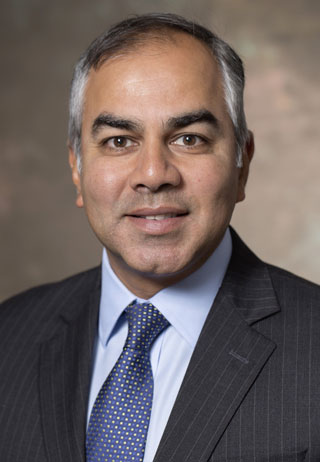
Insights
The ethical implications of continuing living donor transplants during COVID-19
White paper examines how living donor transplantation fits into the priorities of health systems whose resources may be constrained.
Sanjay Kulkarni, M.D., a multi-organ transplant surgeon and medical director of the Center for Living Donors at Yale New Haven Hospital, discusses a new white paper he co-authored with other members the UNOS Ethics Committee.
“An ethical analysis examining the continuation of living donor transplantation during the COVID-19 pandemic,” considers crisis standards of care in developing recommendations for transplant hospitals.

Sanjay Kulkarni, M.D., committee member and coauthor of the white paper
What led to work on this paper?
UNOS came out with an emergent topics methodology where current topics that offer management challenges may be quickly analyzed and feedback provided to the transplant community. The role of living donor transplant and the prioritization of living donor transplant during the COVID epidemic was the first of the emerging topics that was assigned to the Ethics Committee. It was a bit of a “proof of concept” of how agile and quick UNOS can be responding to real-time questions for the transplant community.
What does the committee advise?
Many transplant programs suspended living donor liver and kidney procedures during the first surge of the pandemic. And the question was to the Ethics Committee, what is your position on the prioritization of living donor transplants for transplant hospitals that are in an environment of significant health resource scarcity? Particularly addressing the notion that living donation was “elective” in many circumstances and could be delayed. The aim was not to relitigate or question prior decisions, rather to look at the prioritization of living donor transplant from a donor and recipient perspective and offer guidance that may be relevant in future circumstances where health care resources may be strained.
We’ve laid out a series of guidelines, which we hope will help transplant leaders and transplant hospitals come together and say, can we execute some of these? And if we can, perhaps we should proceed doing living donor transplants in this environment.
Where did you begin?
We delved into an ethical analysis, trying to balance the risks of delaying living donor transplants and the potential benefits of proceeding with it, with safety measures. Then we worked on providing general guidelines to the transplant community. How do the transplant community and hospital administrators deal with these issues when it comes to living donor transplant? Should they be categorically delayed, or is there an argument to continue to do them in an environment that’s safe?
CMS categorizes transplant procedures as tier 3B, which means, do not delay, because they’re lifesaving therapies. They don’t differentiate between living donor transplants and deceased donor transplants. I think it’d be very difficult for them to do that. However, hospitals often categorize living donor transplants as being elective, since a living donor donates for the benefit of somebody else.
The transplant community has always viewed that very carefully, as they should, meaning that the donors should donate free of pressure and within their own comfort level, and therefore, the procedure is an elective one. But you have to strike that right balance in living donor transplantation, because delaying transplants may have adverse effects on the person who needs the transplant and we now recognize that there are psychosocial harms to potential donors who are unable to donate.
When health systems are under contingency standards of care, that means there are strained resources, yet they are attempting to function and provide normal levels of service. This may require strategies, such as triaging or shifting resources from one area to another. In those circumstances, we feel that under specific guidance and protocols, living donor transplant can be done safely and effectively and shouldn’t be delayed.
What is the effect of a temporary delay in living donor transplantation? Some may say it’s not a “lost opportunity” such as would happen with deferring a deceased donor transplant.
Studies have shown that for COVID, in particular, the risk of exposure in a dialysis unit, which oftentimes is three times a week, far exceeds that of the general community. If you are going to delay that transplant for months, that risk of dialysis-related COVID exposure just continues to grow. And we also know that individuals with renal failure tend to have a worse prognosis if they do get a COVID infection.
For liver transplantation, there’s no fail-safe therapy for these individuals. It’s either do the living donor liver transplant, or not. There’s no dialysis. So I think there is an argument to be made under contingency standards that this is a unique service that should be prioritized much higher than it has conventionally been thought by health systems.
Are we seeing a recurring trend in deferring living donor procedures in some places?
It is clear that with both the new wave of COVID infections and natural disasters such as Hurricane Ida, the issues regarding how living donor transplant is prioritized for a health system are going to be an ongoing debate. It should be made clear that our position is under crisis standards of care, such as we are witnessing with a lack of ICU beds or even electricity, it is understandable and ethical to delay living donor transplants.
Does this guidance apply to situations beyond just the COVID-19 pandemic?
Yes. The paper started with COVID, and it most certainly addresses COVID. But we thought there are many instances where local health care resources are stretched, whether it’s, a hurricane, or forest fires, or natural disasters, or local influenza epidemics. Discussing which procedures should be prioritized will need to be carefully considered dependent on the level of health care scarcity and local resource capacity.
Are there other white papers being developed?
Yes. One is addressing the role of psychosocial evaluation and its use in determining transplant candidacy. Much of that has come out in a recent OPTN white paper, but we are looking at how to make that more detailed.
The OPTN Ethics Committee is also seeking public comment on a white paper addressing the ethics of continuous distribution.
About the UNOS Ethics Committee
The UNOS Board of Directors established the UNOS Ethics Committee in 2020. While the committee meets and acts as a UNOS entity, its current membership is the same as the OPTN Ethics Committee.
The UNOS Ethics Committee has an opportunity to discuss ethical considerations and transplantation that are outside the OPTN’s purview. The committee focuses on broad, real-time issues in the transplantation community and responds to them in a framework outside the OPTN policy development process.
The UNOS Ethics Committee shares its messages with the community by disseminating statements, recommendations, and research through UNOS communication channels.
“We delved into an ethical analysis, trying to balance the risks of delaying living donor transplants and the potential benefits of proceeding with it, with safety measures.”
Sanjay Kulkarni, M.D.



